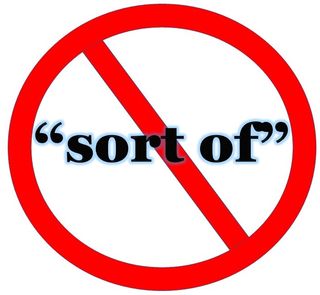Media
I Am Sort of Sick of Hearing "Sort of" in the News
Where did this verbal tic come from and why is it universal in news reporting?
Posted May 13, 2020

When I lived in San Francisco with a bunch of friends in the late '90s, I was trying out a gluten-free and lactose-free diet and bravely testing all of the rice/soy/etc. substitutes on the market. I found one I really loved: Soy Dream “ice cream.” I foisted it on my roommate, Matt, insisting it was delicious; he tried it and said, “Um, it’s “soyta” good.” That reaction still makes me laugh.
And my remembering his silly remark two decades later is evidence of the fact that I pay close attention to language. Consequently, lots of expressions drive me up the wall, including, “I could care less,” “Have a good one,” and especially, “based off of”—the linguistic equivalent of nails on the chalkboard, which, oddly, doesn’t really bother me. (This is a tangent, but real quick: If you could care less, then you do care—what you really mean is you couldn’t care less. And, have a good what? It doesn’t take much effort to fill in the blank and make it a complete thought, e.g., “Have a good night.” Lastly, how are you going to base something off of something else? That makes no sense. Movies are based on books and houses are based on foundations.)
The annoying linguistic tic that’s the focus of this article, though, is the thoroughly ubiquitous usage of the phrase “sort of” by almost everyone in the media, both on TV and radio. The phrase doesn’t seem to be used in professional newspaper and magazine writing, but oral reporting is lousy with it.
I’m most struck by “sort of” when I hear it used in the most inappropriate context, such as, “this type of cancer can be sort of chronic and life-threatening.” Or, “COVID-19 is sort of changing the way we live.” If you haven’t noticed this irksome linguistic habit, you’re so lucky, but once you do, it will drive you crazy because it’s sort of everywhere, sort of all the time.
Why has the phrase “sort of” become so wildly popular in the media?
I have only the faintest idea. In my first-year writing and rhetoric class, we teach our students a writing skill called “hedging your claim.” It refers to the linguistic move of softening your claims to make them a little less disagreeable to potential critics.
For example, instead of writing, “No one could possibly still believe that vaccines cause autism,” which would naturally invite sharp disagreement from anti-vaxxers (or “plague enthusiasts”), you might write, “Though it seems the link between vaccines and autism has been scientifically debunked, there are holdouts who still want more proof that vaccines are safe.” This way, you’re leaving the door open for those who disagree with you and preemptively validating their minority point of view.
I wonder whether the constant usage of “sort of” in TV and radio reporting has something to do with an unconscious desire to present the news not as facts but as mere claims. Why would reporters and anchors want to do that? News media are so divided these days, and frequently dismissive, condescending, and even outright hostile to the other side, so it’s possible the news messengers feel the need to soften their message to try to get their point across without someone attacking them or their message. The use of “sort of” is bipartisan; in fact, it’s universal.
The reason I find this tic annoying is that we intrinsically want the media to deliver us the news, the facts, the truth, and when they constantly hedge their claims with “sort of,” it makes them sound less sure of themselves, and thus less credible. If something is not “fake news,” then it shouldn’t sort of sound that way.
Serenity Gibbons, a guest writer for Entrepreneur, wrote, “While kinda and sorta could work during a casual conversation with a friend… these slang terms shouldn’t be used in your writing or when speaking to colleagues.”
I agree, but I would add, or when reporting the news. She continues, “Steven Kurutz of The New York Times argues that these phrases have 'become a verbal tic, a filler phrase' that we use whenever we’re unsure. So, if you’re 100 percent positive when making a statement, just kinda, sorta, avoid these phrases altogether.”
I sort of completely agree.
References
Gibbons, S. (2017, March 14). 12 Phrases That Are Making You Sound Ignorant. Entrepreneur. Retrieved from: https://www.entrepreneur.com/article/290426




